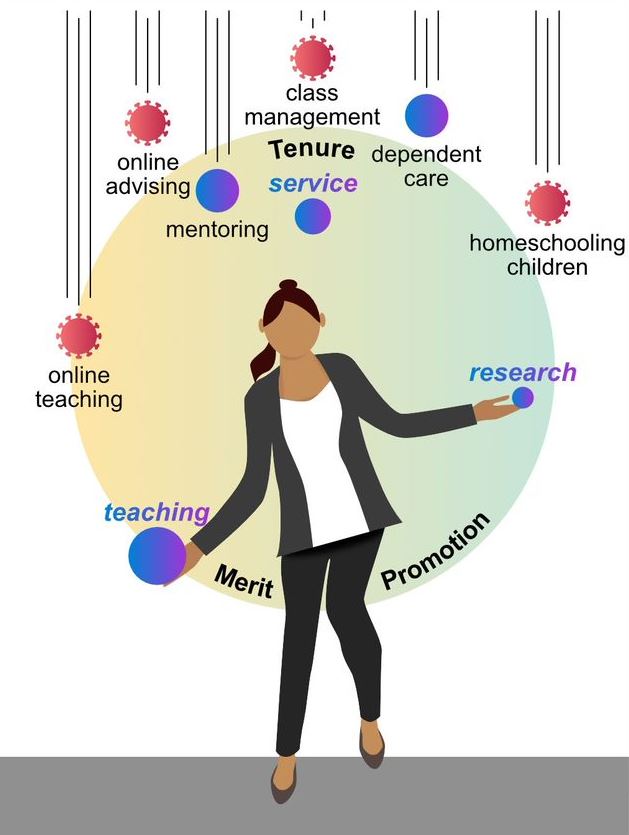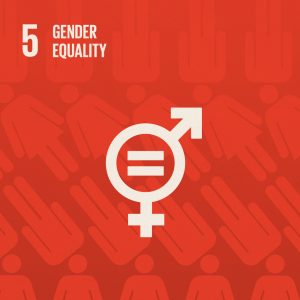By Steph Shepherd

Image created by Roel Fleuren.
In 2015 the UN adopted a resolution titled, “Transforming our World: the 2030 Agenda for Sustainable Development.” Within the plan, 17 sustainable development goals to were identified, including Goal 5 to “achieve gender equality and empower all women and girls”. In the initial Sustainable Development Goals Report, released in 2016, the specific issues discussed under Goal Five were primarily focused on developing nations – decreasing rates of child marriage, eradicating female genital mutilation, addressing inequity in domestic unpaid labor, and increasing the number of women in leadership roles. Reading this list as a white American woman with privilege, it is easy to put this in a mental box as “concerns of others.” But as an academic mother of two young children, one that is medically fragile and needs specialized care, who has just experienced almost two years of the COVID-19 pandemic, I have come to realize these issues directly impact me both personally and professionally. The pandemic has laid bare the truth that women regardless of socio-economic status or country take on a disproportionate share of domestic unpaid labor and hold very few positions of power. Academia, and Auburn University specifically, are a microcosm of these gender inequities.
Unpaid Labor
It is well documented that women in academia shoulder a greater burden of the “invisible labor” of institutional service – serving on committees, conducting outreach, formal and informal mentoring of students – activities that are often not highly valued in annual review or promotion. Since we are conditioned to think of women as caregivers, students, who have questions or concerns, are more likely to seek out women faculty. The combination of the pandemic and racial tensions in the US have impacted students’ mental health. These students need more ongoing support which will continue to disproportionately fall on women, specifically women with intersectional identities (Black, Latinx, APPI, LGBTQ). We have taken on more “caregiving” at work at the same time as many of us lost access to childcare and shifted to remote learning. For many of us the extra labor has not slacked off as the pandemic eases. I hear daily from women students, staff, and faculty that Fall 2021 was the hardest semester of their career, they are burned out, they can’t get a break. Women are exhausted.
Auburn has taken some steps to try to mitigate the impact of the pandemic – tenure clock extensions for early career faculty and flexible work arrangements that allow employees to work remotely. The University has also recently enacted a paid parental leave policy for new parents (birth or adoption), which was long overdue. While these efforts are laudable, they do not apply to students. Women students who are mothers or caregivers have no formal protections. Decisions are made on a case-by-case basis and students are dependent on the empathy of their supervisors and the flexibility of their academic program. This is not a trivial barrier for students with caregiving responsibilities.
I along with many others have discussed the issue of gendered impacts of the pandemic and proposed solutions (e.g. Malisch et al. 2020) that have the potential to address long standing gender inequities throughout the academic hierarchy. To address inherent gender bias, we need the support of university leadership, but the lack of women in positions of power is a primary barrier to change.
Leadership
A quick glance at Auburn’s demographics shows our students are essentially evenly split 50/50 in terms of gender at the undergraduate level, but the number of women drops significantly as you move up the leadership structure of the institution. Our faculty is 59% men overall and 75% of full professors identify as men. University leadership is also dominated by men from the level of department chairs up to the level of Provost and President. You might think that this inequity will be solved over time as the current students move into their careers, but that is not the case. The lack of women in academia as you move to higher and higher levels of success is well-documented and the numbers are even worse for women with intersectional identities – historically excluded ethnic, racial, sexual, gender identity, or disability communities (Alcalde and Subramaniam, 2020). This issue is not isolated to academia. It is apparent across the private and public sectors of our society.
The critical question is how do we change our leadership structure? The UN’s 2030 Agenda is a call to action, but it does not provide a road map. I have my own ideas about how to improve gender equity in academia, but one person cannot solve the problem. Students and faculty can work together to make changes within our institution. We are in a unique position at the moment – we are hiring a new President, Provost, and two Deans. Students and faculty must communicate what we value in leadership to the decision makers, emphasize that we value a more diverse leadership, and hold the decision makers accountable.
Auburn faculty and students are doing amazing research and other scholarly activity related to sustainability that has the potential to change our world. By actively working to improve gender equity at all levels of our institution, we can become part of a solution. We need everyone – women AND men; scientists, artists, engineers, historians, etc. if we are going to achieve the ambitious goals for sustainability in the UN’s 2030 agenda.
REFERENCES
Alcalde, M. C., & Subramaniam, M. (2020). Women in leadership: Challenges and recommendations. Inside Higher Ed.
Cf, O. D. D. S. (2015). Transforming our world: the 2030 Agenda for Sustainable Development. United Nations: New York, NY, USA.
Malisch, J. L., Harris, B. N., Sherrer, S. M., Lewis, K. A., Shepherd, S. L., McCarthy, P. C., … & Deitloff, J. (2020). Opinion: In the wake of COVID-19, academia needs new solutions to ensure gender equity. Proceedings of the National Academy of Sciences, 117(27), 15378-15381.
Post contributed by Dr. Stephanie L Shepherd, Assistant Professor, Department of Geosciences
Learn about the SDGs & AU and our contributions related to this post:





